DCPA Off-Center immersive production ‘Sweet & Lucky: Echo’ leaves a lot of cards on the table.
In the past five years, I’ve had three occasions where I was helping go through the belongings of deceased people. One was my father, one my mother-in-law and the other the mother of my best friend, whom I’d known since I was a teenager.
It’s not a fun job, for the most part. Sure, there’s some walking down memory lane and “remember this?” moments, but depending on the size of the estate, emotions can range from wonder at the volume of stuff to sadness as treasured items are chucked in the trash to downright anger at the absence of any prep on the deceased’s part.
I was thinking about that during Sweet & Lucky: Echo — a new immersive production from the Denver Center Theatre Company’s Off-Center team. A follow-on from 2016’s original Sweet & Lucky, this experience brings audiences into the world of a departed couple, attempting to immerse them in the grief and memory that’s part of most memorial events.
After being split into two groups and entering separate spaces in Off-Center’s temporary Broadway Park building, we were ushered toward the back by several guides — portrayed by local actors. The walls are filled with metal shelves stacked with cardboard boxes of all sizes, displaying labels like “kitchen,” “den” and the like. Also on hand is the deceased couple — an unnamed husband and wife who appear occasionally to reenact scenes from their lives together.
Split again into smaller groups (the overlapping of which provide the eponymous echo), we were asked to pitch in and move tables and chairs around, stack boxes and other small tasks. (You could opt out of this part and just watch, but you’d be missing much of the point, since the audience is treated as a group of people who knew and loved the couple in life.)
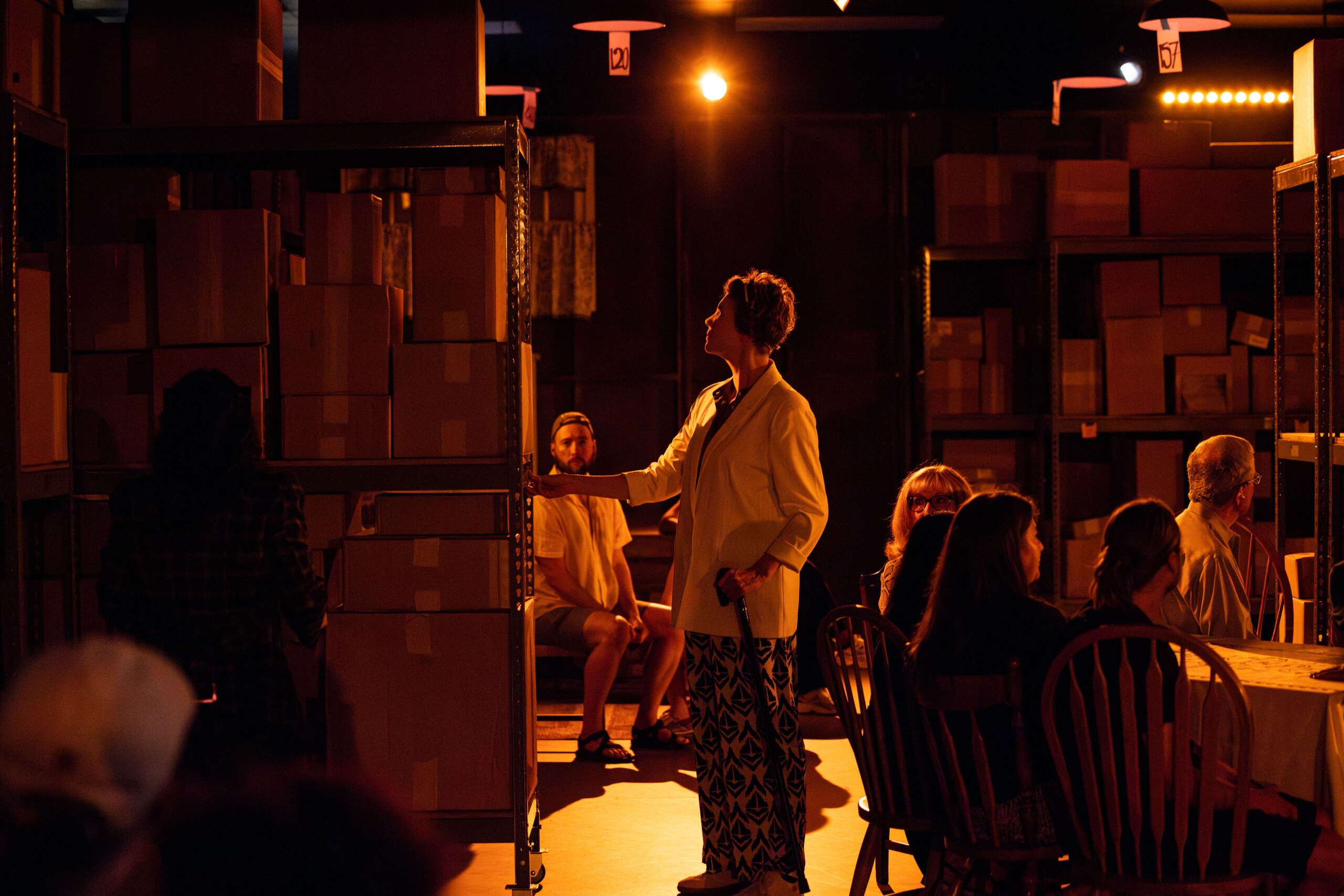
Guide Maggie Whittum in ‘Sweet & Lucky: Echo.’ | Photo: Jamie Kraus Photography
A whole lotta stuff
Along the way we got a chance to interact with each other as we poked through boxes of junk and were prompted to invent memories we had of the couple. Going through a stack of mail, I found myself explaining to some younger folks how airmail letters used to be written on tissue paper. In another section, I was paired with another guy to share a memorable meal (we both had our mom’s chicken recipes). This was for me the most engaging part of the whole thing and one I wish had lasted a bit longer.
There’s a lot of activity with the shelves and boxes, which are wheeled into all kinds of different configurations through the course of the experience. This element has the benefit of inserting a good deal of movement, especially when the audience members are seated.
I found it curious that all the boxes were the same style of blank cardboard as opposed to the typical mishmash of Amazon, printer paper and supermarket boxes we might typically see. With all the shelves equally homogenous, the goal appeared to be to make it all seem rather generic, perhaps making the point that we all experience these things in familiar ways.
I don’t think that’s necessarily true, but certainly all memorial events have a similar vibe. Here, that’s combined with a series of other activities that at times felt like we were at a team-building event, a church service or a Thanksgiving dinner. Much of it is in low light and hushed tones — with some singing and guitar playing in spots — leading us to what we assume will be some kind of … something.
And while there were some memorable portions — particularly an early sing-along in low lighting that had a nice spiritual feel to it — S&L: Echo too often leaves us, the immersed, unsure of what’s going on — or why we’re there.
Missed opportunities
You can see it in the exchanged glances between audience members who know each other and in the uncomfortable dead spots and silences between scenes or events. At one point we were seated holding small electric votives with the guide asking us to place items among the boxes on the shelves with no explanation as to why. In another, we’re going through boxes of memorabilia and everyday items, but the sheer volume of the junk made it impossible to focus on any in particular, which might have created a meaningful discussion. (I should note that I was just in one group; maybe others had more colorful interactions.)
Thinking back on my own recent, real-world experiences, I couldn’t help but feel that, while the setup was there and the action was well designed and directed, ultimately this experience missed a lot of storytelling opportunities. So much of remembering people — particularly a couple — is about the good and the bad, but here we mostly get anodyne memories of a traditional couple we’re told was darn near perfect.
I wanted to hear more anecdotes from the guides (who ostensibly would know the family best) about finding Weird Aunt Cathy gnawing on a frozen meatloaf at 3 a.m. — or the time Little Johnny hurled in the punchbowl. All families have stuff like this, and they often fuel a great deal of laughter among the tears at funerals. That in turn could have inspired a sharing of audience stories that could’ve been a ton of fun — and more genuinely interactive.
For the couple at the center of S&L: Echo, a broken model sailboat is about as dramatic as it gets. Whether it’s an immersive production like this or traditional theatre, character and story is everything — and here those elements are simply too thin. Who were these people and why should we care about them? The first is answered on a surface level, but the second is less so because so much detail is left out — or isn’t teased out of the experience in a compelling way.
Where the piece succeeds is in bringing people together to share in the lives of two strangers we’re prompted to pretend we knew. It compels the audience to interact and imagine who they were, how we might feel about them and perhaps even how we’d feel if the shoe was on the other foot. Getting our hands a little dirtier with a deeper dive into the layers of these lives would have made it more engaging, but in the end it’s not enough to create the special or even magical event I expected it would be.
Alex Miller is editor and publisher of OnStage Colorado. He has a long background in journalism, including stints as the top editor at the Vail Daily, Summit Daily News, Summit County Journal, Vail Trail and others. He’s also been an actor, director, playwright, artistic director and theatre board member and has been covering theatre in Colorado since 1995.
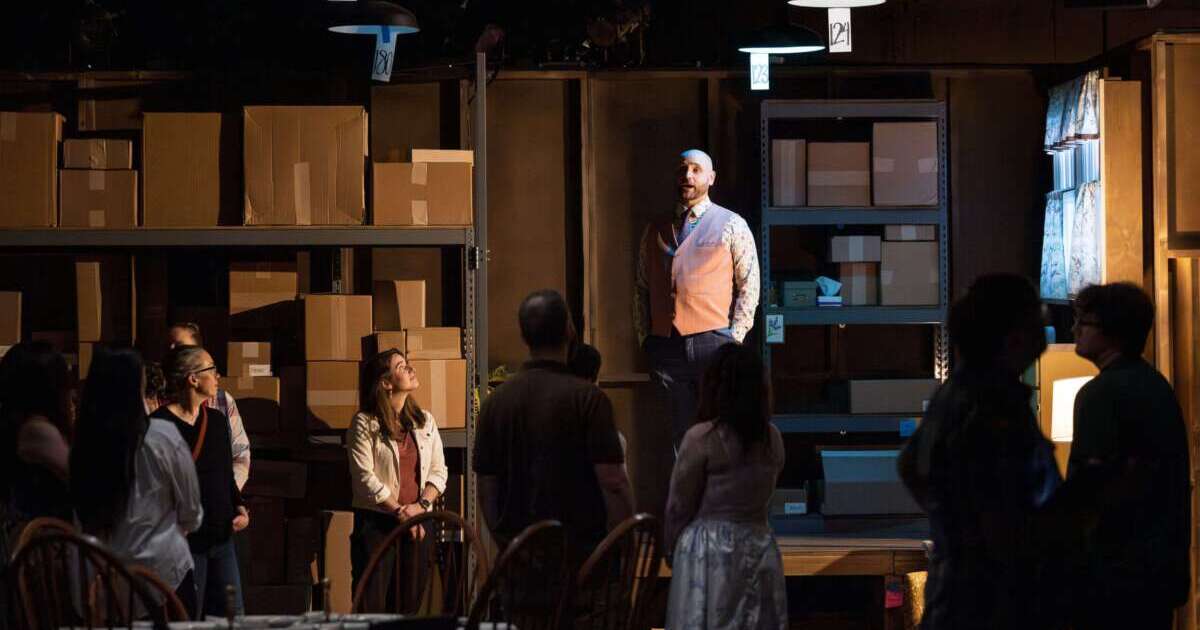

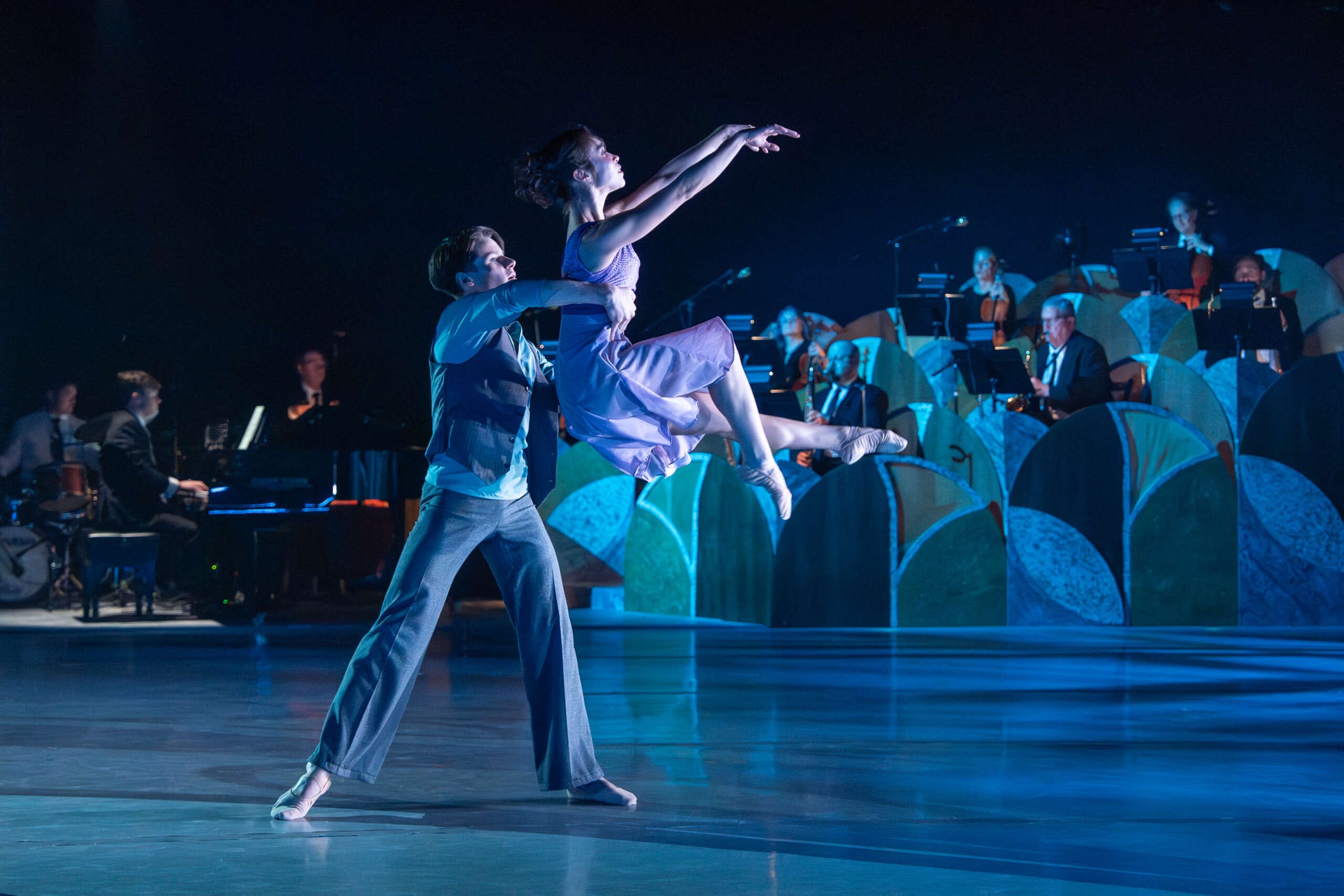
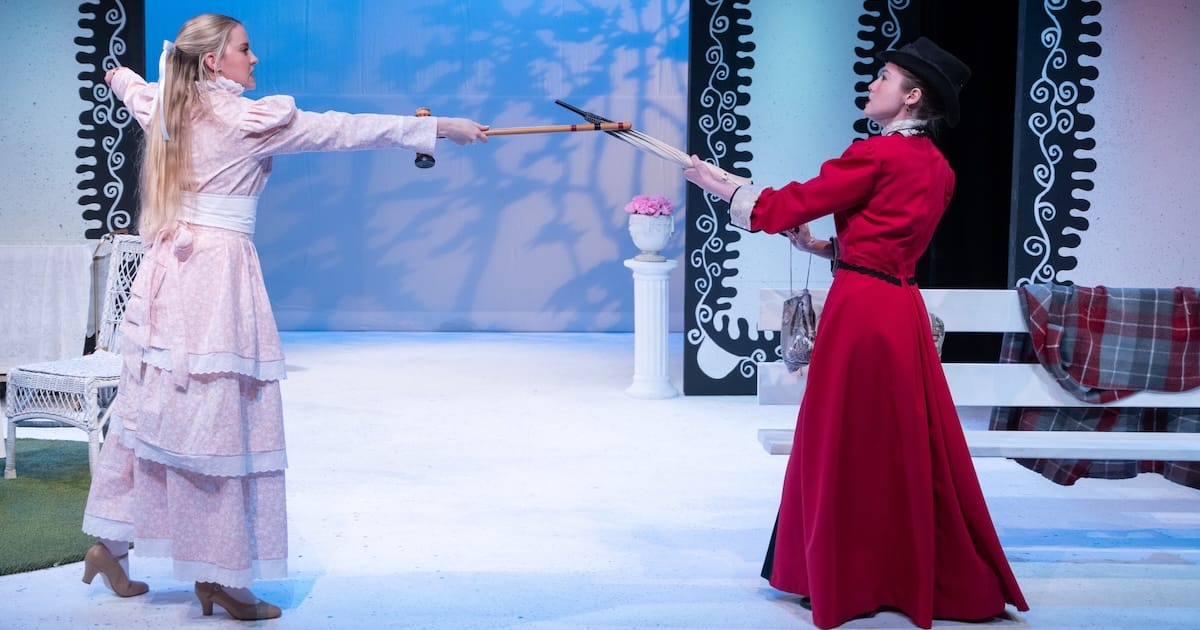
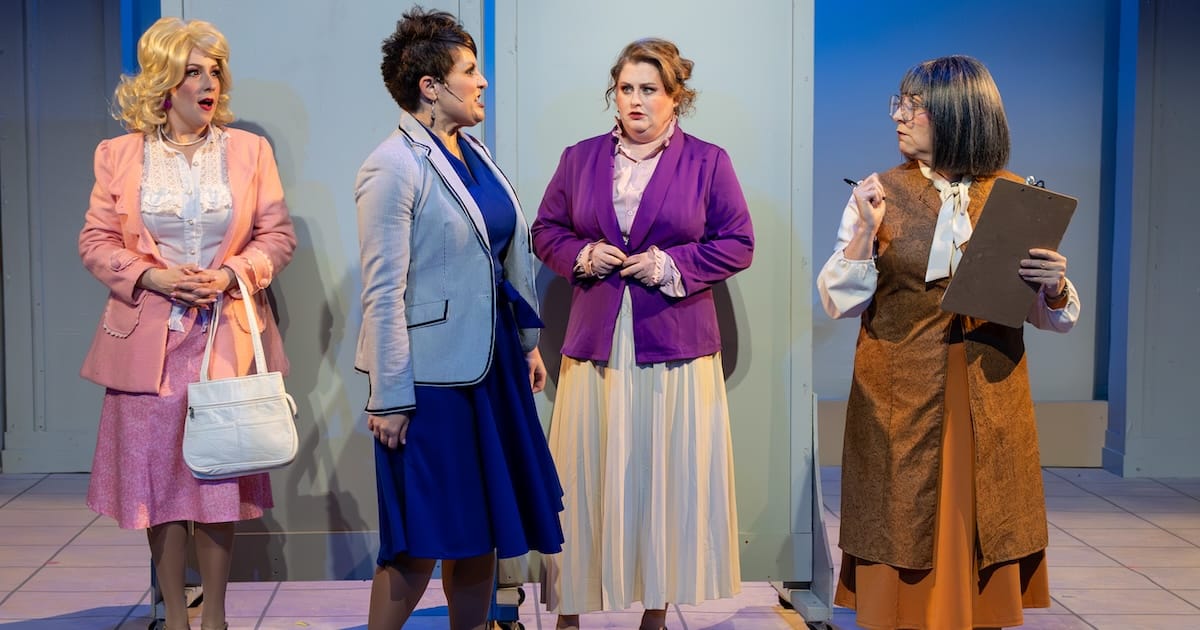


This is dissapointing to hear. The original Sweet and Lucky from nearly 10 years ago was a defining moment in theatre for me. It was beautifully constructed and there were moments that still live in my mind, like when I was grabbed by the hand and pulled into a room that contained a functional swimming hole underneath glittering “stars” where the actors treaded water while saying their lines. When I heard it was coming back I figured it wouldn’t totally live up to my memories of it but this sounds nothing like the magic the show had in 2016.
Appreciate this review – especially as someone who is a bit skeptical of immersive theatre. Easy to get distracted and lost in the ‘interactivity’ components when the storytelling should be at the heart of theatre.
I cannot agree with you more !! I’m a stagehand on S&L Echo, and even after running, and watching the show many times , I can’t help but feel lost . This show has an amazing story to tell , and falls short when trying to tell it . It is very moving , but I think it’s moving because it’s dealing with subject matter that’s already very sensitive. I feel that there was such a push and pull between trying to make the show immersive while also trying to tell a story and expand on the characters we are presented. That it lost sight of the story. I don’t know though I just push the shelves and move stools and boxes around while sweating profusely